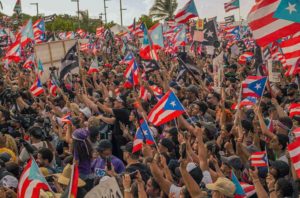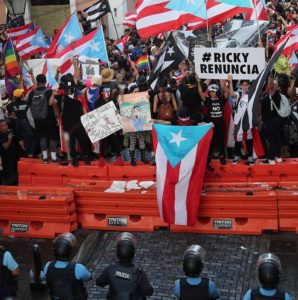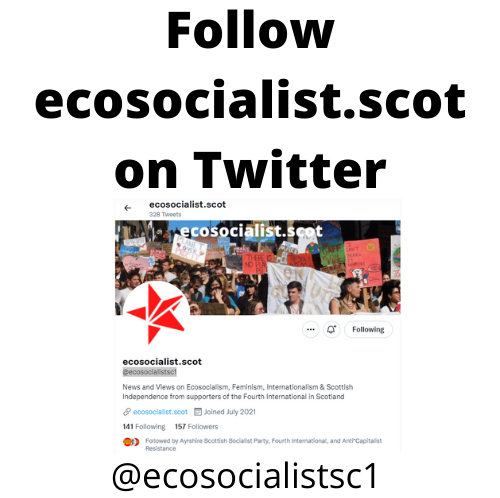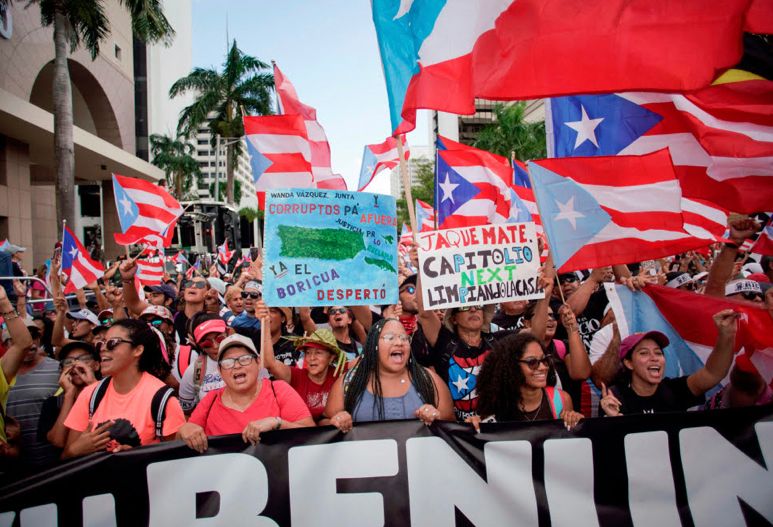COP26 brought all the world and its political issues to the Clyde for a few weeks in November. Catching a quiet moment away from the demos and kettles, Paul Inglis [of ecosocialist.scot] spoke to Paul Figueroa, a prominent member of the Puerto Rican Independence Party visiting Scotland during the conference. Ranging across the history of the island and its politics, particularly the issues of climate change and imperialism, this interview presents the cause of Puerto Rican independence to a Scottish audience.
Puerto Rico is not usually an island that occurs to the Scottish political imagination. Our international awareness, at least within the independence movement, is mostly centred on places like Catalunya and Wales, with an occasional (but rather reserved) glance at the Basques now and then. We draw lesson and inspiration, if at all, from a fairly small pool of contemporary national movements, and barely look beyond Europe in the process. Apart from fairly predictable Euro-centrism, this narrowness of outlook speaks to the fact that our most ready analogues are afforded by countries in similar social and economic situations.
Not just the enthusiasts of the left but most indymarchers would point out that Scotland has little in common with the historical experience of colonised nations like Egypt or Angola, never mind ongoing anticolonial struggles like those in Puerto Rico or the Mapuche lands. Scotland is simply not a colonised country (though of course one could speak of a form of internal colonialism practiced by both Scots and English against the Gaels) and only in the wildest dreams/tweets of certain sectors of the indy movement do the problems imposed on us by Westminster bear even slight resemblance to anything visited upon the Kurds by the Turkish government.

As such, it is either by an unconscious or a tactful choice that we generally keep our eyes on European matters. This certainly avoids falling into ridiculous and insulting direct comparisons between ourselves and peoples who are currently experiencing brutal, life-or-death struggles for freedom, but I also believe it can accidentally result in a different, and distinctly limiting, kind of euro-centrism, one that assumes offhand that little of the previous or current history of national liberation in Africa, Asia and Latin America can teach us anything.
So keen are we to not seem appropriative or offensive that we can risk ignoring great and helpful lessons. Just think about the challenges that the national question sets before Scottish socialists on a daily basis: What sort of classes (or fractions of classes) take part in the national movement? Where do the goals of the working class and the nationalist bourgeoisie/middle class diverge? How does imperialism constrict and hinder self-determination? How does the socialist movement orientate itself amidst all this? We should realise that these exact questions have troubled national movements past and present all over the globe, and that the ways in which they attempted to give answers yield a vast storehouse of reference material for us to consult. As long as we do not pretend that we can simple harvest direct or ready-made lessons, there is a lot that we can gain by looking beyond Europe, and we should not be afraid to do so.
It was for this reason that I was excited to sit down and speak to Paul Figueroa, a member of the Puerto Rican Independence Party (PIP), amid all the rush and activity of COP26. Paul, who stood as the PIP’s candidate for council in San Juan during the 2020 elections, had come here during the conference on the invitation of Scotland’s Radical Independence Campaign to speak at a meeting of the COP26 protest coalition’s “Peoples’ Summit”, and to make international links and connections. Naturally then, it was the perfect opportunity to find out what the fight for Puerto Rican freedom can teach us here in Scotland.
My first question dealt with the topic that was on everyone’s lips during those November weeks: Climate change. I asked Paul a question with two parts: What does climate change, and what would climate justice mean for Puerto Rico? Climate change is a bleak prospect in general, obviously, but for an island nation it is especially pressing. Paul said that “if austerity and privatisation don’t kill off the Puerto Rican people, climate change will,” pointing to the fact that for every one centimetre rise of the sea, the island loses a yard of coast. Not only this, but there is the impending threat of consistent drought and the danger that an increase in landslides means for a mostly mountainous country like Puerto Rico.
The problem with getting climate justice, Paul explained, is that the kinds of steps Puerto Rico must take to help tackle climate change are essentially blocked off by the economic interests of the United States of America. In the last year, the entirety of the island’s energy grid was privatised, falling into the hands of an American company, Luma Energy, which has stated that it has no interest in pursuing green energy. Indeed, American interests have even pushed the Puerto Rican government to enact what Paul termed a “tax on the sun”- that is, a tax on anyone going off the fossil fuel-based grid to use solar power. As a Caribbean country, the green alternative for Puerto Rico is naturally solar energy, but Luma is standing in the way of this in favour of fossil fuels. Just as the grid is controlled by an American company, so too is the supply of coal and gas, most of which comes from the firm Applied Energy Systems. This leaves Puerto Rico dependent on the USA for energy when a safer, cleaner alternative is right at hand. And the fruits of this toxic, dirty dependency are dearly bought. Paul was stark on this point: “For island nations, climate change is a matter of life and death.” To underline this, he gave the example of the town of Peñuelas, where the coal ash from the power plants is dumped. It has the highest rate of cancer and birth defects in Puerto Rico.
All of this for the profit margins of the Yankee coal industry, and the stuffed pockets of West Virginian members of congress. And they too, like Luma Energy, lobby the Puerto Rican government to keep their vested interests secure. In contrast to this, climate justice would mean an opportunity for Puerto Rico, and Puerto Ricans, to make their own climate policy, not lobbyists from Wall Street or Washington. This is a freedom that has long been denied the Puerto Rican people, held down as they are by the United States’ political and economic imperatives. Considering a situation like that, Paul was not enthusiastic about COP26’s significance for the island. Discussing Puerto Rico’s lack of representation on international bodies like the United Nations, CARICOM (Caribbean Community), CELAC (Community of Caribbean and Latin American States) and the OAS (Organisation of American States), Paul argued that the island therefore lacks a seat at the table for global discussions and decisions which will be crucial for its future. Frustrated by “the posturing of the larger countries and leaders like Biden and Johnson”, Paul felt that “they need to decide if they lead, follow or get out of the way” and let the countries with the most at stake have the deciding say.

Unavoidably, this talk of freedom to make choices, and the obstacles to that freedom, led into a discussion of the colonial relationship between the United States and Puerto Rico. How did this state of affairs, where the USA, and American businesses, can do what they like with Puerto Rico, come to be? In order to get an idea of why, I next asked for some historical background. Of course, the history of any land is a rich and varied ocean, and the story of Puerto Rico is no exception. Therefore, Paul aimed at giving me a quick gloss, one that covered the key points.
He started at the beginning of Puerto Rico’s time as a colony, with the Spanish invasion of Borinquen, as the island is known in the indigenous Taino language, in 1493. From there stemmed three hundred years of indigenous and enslaved African rebellions, centuries of continuing struggle against imperial Spanish rule. One of the most important uprisings of this Spanish colonial period was el Grito de Lares (the Cry of Lares) in 1868. This was an insurrection, beginning in the town of Lares, which aimed at independence and a Puerto Rican republic- The first such national rebellion in the island’s history. And while it may have been defeated, Lares was the birth of the Puerto Rican national consciousness, identity and flag. Thirty years later, the Spanish-American War saw Puerto Rico, as well as Cuba and the Philippines, wrenched from the grip of Spain by a new colonial overlord, the United States of America,
Any hopes that Puerto Ricans might have had for a better future without Spanish control were quickly dashed, as the American takeover precipitated a dramatic, costly change in the island’s fortunes. Immediately following their victory, the United States devalued the currency by 40%, stopped Puerto Rico from controlling its own trade with other countries, and began breaking up the networks of small farmers that underpinned Puerto Rico’s economy in favour of large scale, industrial sugar farming run by a handful of absentee American businesses. The result was a strengthening of the sort of export-crop monoculture that has thus far played such a limiting, exploitative and destructive role in the history and ecology of the Caribbean. While the United States profited from its new colony, Puerto Rico came to be known during the Twentieth Century as “the Poorhouse of the Caribbean.”
Not just economic damage, but cultural oppression came with the Americans. Most blatantly, there was the attempt to make the Spanish language illegal, to anglicise the country. In a particularly crass move, the island’s name was even officially changed to the more Anglo-sounding “Porto Rico” from 1899 to 1932. Students of Russian history might here be reminded of the old empire’s attempts at forcibly “Russifying” its national minorities, or perhaps the long campaign against Gaelic by first the Scottish and then the British state has sprung to your mind. The Americans also attempted to clamp down on Puerto Rican holidays and foist their experiment with booze prohibition onto the island too.
These simultaneous cultural and economic troubles, and their joint link to the effects of American imperialism, meant that the independence movement and the workers’ movement became easily and naturally connected. Paul gave the example of how, from the 1930’s to the 1950’s, there were more than two hundred workers’ strikes, and almost all of them were led by the nationalist party. In 1950, the nationalists would take the fight for independence even further, renouncing pacifism and launching a war for independence that, like el Grito de Lares almost a century prior, was defeated. The years following this setback marked the most intense period of persecution for independence supporters, with the Americans bringing in a gag law which made the Puerto Rican national anthem illegal and banned meetings or discussion of both independence and socialism. This, coupled with the “Carpeteo”, the constant FBI and police spying on independence supporters, spurred the emergence of clandestine militant groups on the lines of the Guevarist guerrilla strategy popular across Latin America in that era.
These days did not yield a favourable environment for the PIP. Unlike the nationalist party and the guerrilla groups, the PIP does not uphold armed struggle as a strategy or tactic. But with the repressive Carpeteo making open organising for independence and socialism difficult, the PIP quickly went from being the main opposition party to a minority party, holding just two percent of the vote right up to the present day. As for the armed conflict, it would continue into the early 2000’s, with the 2005 assassination of guerrilla leader Filiberto Ojeda Rios by the FBI marking something of a turning point for the independence movement- People who wouldn’t necessarily have agreed with Ojeda Rios’ methods or politics were incensed by his murder, and took to the streets protesting against U.S. intervention in Puerto Rican politics.
Paul saw this as one of the chief causes of a renewed inerest in Puerto Rican independence since the millennium. Another lies in the concurrent dispute taking place over the island of Vieques, one which had a similar galvanising consequence for the movement. Vieques is an island of the Puerto Rican archipelago which the U.S. military used as a testing ground for above-ground and underwater bombs from 1941 onwards. After an American bomb accidentally killed David Sanes, a Vieques citizen, the PIP launched a campaign against bomb testing which saw activists sailing from the main island to Vieques on fishing boats to camp out on the beaches and occupy U.S. military property. Even with arrests and repression, the sustained militancy of the campaign led to a success, with the U.S. military withdrawing from Vieques in 2003. In a speech celebrating this victory, the president of the PIP, Rubén Berríos Martínez, said: “Yesterday Lares, today Vieques, tomorrow Puerto Rico!”
This recent history brought us up neatly to the matter of my next question, which turned on contemporary events and their significance for the Puerto Rican independence movement. Paul emphasised the importance of the Puerto Rican economic crisis, which has been ongoing since 2006. To prop up the economy, the island’s government has taken on a great deal of debt since the crisis- fifty billion dollars from 2006 to 2016, which dwarfs the twenty billion dollars of debt accumulated between 1952 and 2006. By 2016, the former governor Alejandro García Padilla had declared the debt unpayable, calling on the U.S. government to address the debt crisis.
At the level of normal peoples’ lives, the figures Paul had for me were grim ones- From the beginning of the crisis in 2006, around a quarter of Puerto Rico’s population has migrated away to the United States. There is a poverty rate of sixty percent, and the island is one of the top five countries of the world for income inequality. In a typical austerity response by the government, huge swathes of Puerto Rican society have been privatised- Healthcare, the highways, public transport, energy and sections of the education system. In particular, the marketisation of education can be seen in how university tuition fees have more than quadrupled since 2006.
The youth of Puerto Rico, the first-time voters of today, Paul continued, “are people who have never had a memory of Puerto Rico in prosperity, of Puerto Rico not in a time of crisis. They see no opportunity or future in their own country.” A result of this is that the fear people have traditionally had that independence and socialism would cause massive poverty has tended to fall away. After all, Paul pointed out, Puerto Rican people “are living those conditions right now under a U.S. flag.”
This growing discontent manifested in 2019 with the “Ricky Renuncia” protests against governor Ricardo Rosselló over the government’s response to Hurricane Maria and his overall apathy to the problems of the people. From that movement, Paul traces a new openness to Puerto Rican independence and new youth participation in the electoral process, this from a youth that tends to be overwhelmingly pro-independence. An illustration of this is the PIP’s recent electoral fortunes, with an increase from two percent of the vote in 2016 to almost fifteen percent in 2020 during a five-way race. Paul was understandably very, very hopeful about these new developments among the youth.
Of course, the problems of austerity have continued to make life tough, especially because they are imposed from outside with little Puerto Rican say in the matter. There is the continuing issue of the Control Board, an unelected body of seven people chosen by the U.S. president and salaried with Puerto Rican tax money who are in charge of overseeing Puerto Rican finances and repayment of the debt. The board have proven voracious, bringing in a forty year long hike on sales tax and a forty year tax on electricity to make up for the period when energy was nationalised. PROMESA, the law that inaugurated the board, states that the Control Board will exist until Puerto Rico has had five consecutive years of balanced budget. However, the Board recently marked its fifth anniversary without a single year of balanced budget. Paul pointed out that like any austerity program, the point is not to save the economy but simply to perpetuate the problem, to asset strip and transfer whatever wealth isn’t nailed down into rich pockets. In contrast to this, the PIP’s position is that the Board should be abolished, PROMESA repealed, and Puerto Rico’s debt should be forgiven. As ever, an essential part of any meaningful self determination is economic sovereignty.
Bringing things to a close, I asked Paul what importance the solidarity of other independence movements, like ours in Scotland, has for the Puerto Rican struggle. “No country exists in a vacuum,” Paul began. Discussing world politics today, he was struck by the way in which independence movements are on the rise across a variety of nations, like Scotland, Wales and Catalunya. He was also very impressed by Barbados’ recent steps towards becoming a republic. He explained that local actions and developments like the ones already mentioned have repercussions on a global scale, so that what might seem on first glance to be isolated fights for self determination end up taking on a significance that leaps borders and crosses oceans to inspire and teach others. It is well to remember, even if we never learn of them, that we in Scotland have sympathisers and admirers all across the world, and our struggles, and, I hope, our victories, will cheer and excite the passions of a great multitude of fellow fighters.
Secondly, solidarity matters to Paul because part of the essential groundwork for Puerto Rican independence is establishing relationships with other countries and movements. After all, Paul argued, “independence is not to separate us from the United States but to unite us with the rest of the world.” And this unity is to be a different kind of unity from the one-sided, opportunistic unity Puerto Rico has thus far experienced with the United States. The PIP looks for relationships of reciprocity, solidarity, camaraderie and respect with other countries- International co-operation, not exploitation. That wish, to be an active and progressive player in the wider world, not just one part in a stifling union with an imperialist power, is something I’m sure Scottish readers with readily sympathise with. It is a fine sentiment, and Paul summed it up wonderfully by once more quoting Rubén: “One day we’ll be able to hug our brethren from across the world and say to them: Comrades, we have arrived late to freedom, but because of that we love it even more.” May the day arrive swiftly!
If you want to keep up with Paul Figueroa and the PIP, you can follow them on social media:
Paul’s Twitter: @paul_delpip
Paul’s Facebook Page: @paulfigueroapip
The PIP’s Twitter accounts: @PIPTwitteando @PIPSanJuan
The PIP’s websites: independencia.net and juandalmau.com
Reproduced from Bella Caledonia: https://bellacaledonia.org.uk/2021/12/24/the-island-and-the-river/
Help to support independent Scottish journalism by donating today to Bella Caledonia.





